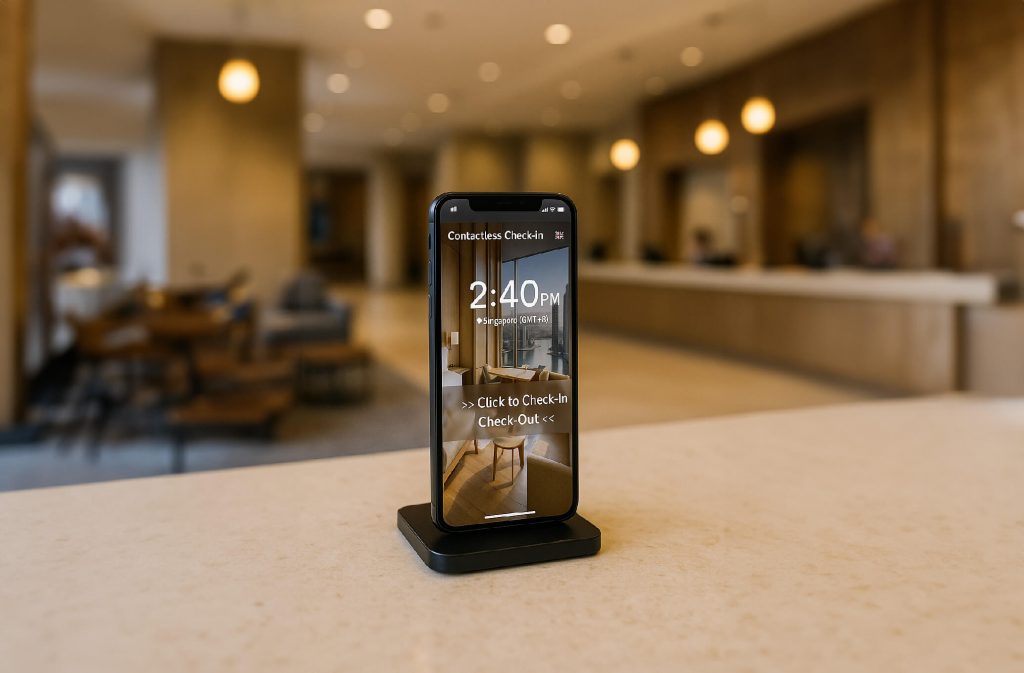
How Hotel Self Check-In Systems Are Solving Labor Challenges in the Hospitality Industry
Introduction
The hospitality industry has faced some tough challenges in recent years, and perhaps none are more pressing than the rising cost of labor and the difficulty of hiring and retaining employees. For hotel owners and managers, these issues are creating operational headaches and cutting into profit margins.
Thankfully, innovative technology like the hotel self check-in system is helping to address these challenges. By automating the guest check-in process, self check-in systems not only reduce the dependency on front desk staff but also improve operational efficiency and cut down costs.
This blog dives into what self check-in systems are, their benefits in relation to labor challenges, real-world use cases, and how to select the right system for your hotel’s needs.
What is a Hotel Self Check-In System?
A hotel self check-in system is a solution that automates the entire check-in process. Instead of relying on the traditional front desk setup, guests can check in via kiosks, mobile apps, or online platforms. These systems integrate with your hotel’s property management software (PMS) to handle tasks like room assignments, digital key generation, and payment processing.
Self check-in systems are often part of broader hotel auto check-in systems, which are designed to minimize the human involvement required for standard front desk operations. For hotels struggling with staffing costs and shortages, this technology can be a game-changer.
The Impact of Labor Costs and Staffing Shortages on Hotels
Rising labor costs and staffing shortages have become two of the biggest hurdles in the hospitality industry. Here’s how they’re affecting hotels today:
- Higher Operational Costs: Wages for front desk staff, overtime payments, and benefits are taking an increasing share of hotel budgets.
- Staffing Shortages: Many hotels are struggling to hire enough skilled employees, forcing existing staff to take on extra work and risking burnout.
- Guest Experience Pressure: Staff shortages and high turnover can lead to longer wait times for guests and a decline in service quality.
For hotel owners and managers, balancing the need for excellent service with these mounting challenges can feel overwhelming. This is where self check-in systems shine as a solution.
How Hotel Self Check-In Systems Reduce Labor Challenges
Adopting a hotel self check-in system offers hotels significant relief from labor-related problems. Here’s how:
1. Reduced Dependency on Front Desk Staff
With self check-in systems, hotels can automate the check-in process, eliminating the need for multiple front desk staff to handle arrivals. This reduces staffing requirements, especially during peak check-in times, and allows you to operate with a leaner team.
2. Lower Labor Costs
By relying less on human resources for repetitive tasks like check-ins and room assignments, hotels can save on wages, overtime costs, and training expenses. The funds saved can be redirected to other areas of the business, such as marketing or guest amenities.
3. Less Burnout for Existing Employees
When staff members aren’t overwhelmed by routine tasks, they can focus on more meaningful, guest-focused interactions. A happier, less stressed team is more productive and less likely to leave, improving employee retention rates.
4. Operational Efficiency
Self check-in systems, paired with hotel check-in system software, ensure operations run smoothly even when staffing is limited. Tasks like guest registration, processing payments, and issuing keys are handled automatically, reducing the potential for human error.
5. Scalability Without Hiring
Whether you’re a small boutique hotel or a large chain, self check-in systems enable you to handle a growing number of guests without increasing your headcount. This is particularly beneficial during busy seasons when hiring temporary staff is difficult.
Real-World Use Cases
Hotels around the world are already leveraging self check-in systems to mitigate staffing challenges. Here are a few examples:
- Urban Hotels: Hotels in busy cities are adopting kiosks and mobile apps to manage high guest volumes without increasing staff.
- Resorts: Resorts often face seasonal spikes in demand, making it hard to hire temporary staff. Self check-in systems ensure smooth operations year-round.
- Chain Hotels: Large hotel groups use self check-in systems to standardize processes across properties while keeping labor costs in check.
- Boutique Hotels: Small hotels with limited staff benefit greatly from self check-in systems by automating routine tasks and freeing up staff to deliver personalized services.
How to Choose the Right Hotel Self Check-In System
Not all self check-in systems are created equal. To find one that aligns with your hotel’s unique needs, consider the following factors:
1. Ease of Integration
Choose a system that integrates seamlessly with your existing PMS, payment gateways, and other software tools. This ensures smooth operations without disrupting your workflows.
2. User-Friendliness
Guests should be able to easily use the system without assistance. Look for a solution with an intuitive interface suitable for all age groups.
3. Cost-Effectiveness
Evaluate the total cost of ownership, including setup, training, and maintenance fees. Some systems may offer affordable pricing without compromising on quality.
4. 24/7 Support
Technology requires maintenance. A provider with robust customer support can help you quickly resolve any issues, minimizing downtime and guest inconvenience.
The Future of Hotel Technology
The hospitality industry is only at the beginning of a major technological transformation. Here are some trends that will shape the future of self check-in systems and hotel operations:
- AI and Machine Learning: Predict guest preferences and offer personalized services, from room selection to discount recommendations.
- Mobile-First Solutions: Mobile check-in options will continue to grow, giving guests ultimate convenience.
- Automation Beyond Check-In: Fully automated processes for check-outs, housekeeping, and during stay upselling are becoming the norm in hotel new technology.
- IoT Integration: Self check-in systems will integrate with smart room devices to offer tailored guest experiences, such as pre-set temperatures and lighting preferences.
Hotels that adopt these technologies now will position themselves as leaders in the industry while effectively managing labor challenges.
Invest in a Hotel Self Check-In System Today
Labor shortages and rising costs don’t have to limit your hotel’s success. With a hotel self check-in system, you can reduce dependency on staff, cut down on costs, and improve operational efficiency without sacrificing guest satisfaction.
Are you ready to revolutionize your check-in process and streamline your operations?
Contact us today for a free demo. Together, we can build a more efficient, profitable, and future-ready hotel business.

How Hotel Self Check-In Systems Are Solving Labor Challenges in the Hospitality Industry
Introduction
The hospitality industry has faced some tough challenges in recent years, and perhaps none are more pressing than the rising cost of labor and the difficulty of hiring and retaining employees. For hotel owners and managers, these issues are creating operational headaches and cutting into profit margins.
Thankfully, innovative technology like the hotel self check-in system is helping to address these challenges. By automating the guest check-in process, self check-in systems not only reduce the dependency on front desk staff but also improve operational efficiency and cut down costs.
This blog dives into what self check-in systems are, their benefits in relation to labor challenges, real-world use cases, and how to select the right system for your hotel’s needs.
What is a Hotel Self Check-In System?
A hotel self check-in system is a solution that automates the entire check-in process. Instead of relying on the traditional front desk setup, guests can check in via kiosks, mobile apps, or online platforms. These systems integrate with your hotel’s property management software (PMS) to handle tasks like room assignments, digital key generation, and payment processing.
Self check-in systems are often part of broader hotel auto check-in systems, which are designed to minimize the human involvement required for standard front desk operations. For hotels struggling with staffing costs and shortages, this technology can be a game-changer.
The Impact of Labor Costs and Staffing Shortages on Hotels
Rising labor costs and staffing shortages have become two of the biggest hurdles in the hospitality industry. Here’s how they’re affecting hotels today:
- Higher Operational Costs: Wages for front desk staff, overtime payments, and benefits are taking an increasing share of hotel budgets.
- Staffing Shortages: Many hotels are struggling to hire enough skilled employees, forcing existing staff to take on extra work and risking burnout.
- Guest Experience Pressure: Staff shortages and high turnover can lead to longer wait times for guests and a decline in service quality.
For hotel owners and managers, balancing the need for excellent service with these mounting challenges can feel overwhelming. This is where self check-in systems shine as a solution.
How Hotel Self Check-In Systems Reduce Labor Challenges
Adopting a hotel self check-in system offers hotels significant relief from labor-related problems. Here’s how:
1. Reduced Dependency on Front Desk Staff
With self check-in systems, hotels can automate the check-in process, eliminating the need for multiple front desk staff to handle arrivals. This reduces staffing requirements, especially during peak check-in times, and allows you to operate with a leaner team.
2. Lower Labor Costs
By relying less on human resources for repetitive tasks like check-ins and room assignments, hotels can save on wages, overtime costs, and training expenses. The funds saved can be redirected to other areas of the business, such as marketing or guest amenities.
3. Less Burnout for Existing Employees
When staff members aren’t overwhelmed by routine tasks, they can focus on more meaningful, guest-focused interactions. A happier, less stressed team is more productive and less likely to leave, improving employee retention rates.
4. Operational Efficiency
When staff members aren’t overwhelmed by routine tasks, they can focus on more meaningful, guest-focused interactions. A happier, less stressed team is more productive and less likely to leave, improving employee retention rates.
5. Scalability Without Hiring
Whether you’re a small boutique hotel or a large chain, self check-in systems enable you to handle a growing number of guests without increasing your headcount. This is particularly beneficial during busy seasons when hiring temporary staff is difficult.
Real-World Use Cases
Hotels around the world are already leveraging self check-in systems to mitigate staffing challenges. Here are a few examples:
- Urban Hotels: Hotels in busy cities are adopting kiosks and mobile apps to manage high guest volumes without increasing staff.
- Resorts: Resorts often face seasonal spikes in demand, making it hard to hire temporary staff. Self check-in systems ensure smooth operations year-round.
- Chain Hotels: Large hotel groups use self check-in systems to standardize processes across properties while keeping labor costs in check.
- Boutique Hotels: Small hotels with limited staff benefit greatly from self check-in systems by automating routine tasks and freeing up staff to deliver personalized services.
How to Choose the Right Hotel Self Check-In System
Not all self check-in systems are created equal. To find one that aligns with your hotel’s unique needs, consider the following factors:
1. Ease of Integration
Choose a system that integrates seamlessly with your existing PMS, payment gateways, and other software tools. This ensures smooth operations without disrupting your workflows.
2. User-Friendliness
Guests should be able to easily use the system without assistance. Look for a solution with an intuitive interface suitable for all age groups.
3. Cost-Effectiveness
Evaluate the total cost of ownership, including setup, training, and maintenance fees. Some systems may offer affordable pricing without compromising on quality.
4. 24/7 Support
Technology requires maintenance. A provider with robust customer support can help you quickly resolve any issues, minimizing downtime and guest inconvenience.
The Future of Hotel Technology
The hospitality industry is only at the beginning of a major technological transformation. Here are some trends that will shape the future of self check-in systems and hotel operations:
- AI and Machine Learning: Predict guest preferences and offer personalized services, from room selection to discount recommendations.
- Mobile-First Solutions: Mobile check-in options will continue to grow, giving guests ultimate convenience.
- Automation Beyond Check-In: Fully automated processes for check-outs, housekeeping, and during stay upselling are becoming the norm in hotel new technology.
- IoT Integration: Self check-in systems will integrate with smart room devices to offer tailored guest experiences, such as pre-set temperatures and lighting preferences.
Hotels that adopt these technologies now will position themselves as leaders in the industry while effectively managing labor challenges.
Invest in a Hotel Self Check-In System Today
Labor shortages and rising costs don’t have to limit your hotel’s success. With a hotel self check-in system, you can reduce dependency on staff, cut down on costs, and improve operational efficiency without sacrificing guest satisfaction.
Are you ready to revolutionize your check-in process and streamline your operations?
Contact us today for a free demo. Together, we can build a more efficient, profitable, and future-ready hotel business.




